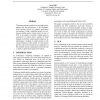Free Online Productivity Tools
i2Speak
i2Symbol
i2OCR
iTex2Img
iWeb2Print
iWeb2Shot
i2Type
iPdf2Split
iPdf2Merge
i2Bopomofo
i2Arabic
i2Style
i2Image
i2PDF
iLatex2Rtf
Sci2ools
GECCO
1999
Springer
1999
Springer
On using ZCS in a Simulated Continuous Double-Auction Market
This paper presents results from on-going investigations into the performance of the Michiganstyle classifier system in a complex multi-agent environment. Using a simplified model of a continuous double-auction market place the use of ZCS as an adaptive economic trading agent is examined. It is shown that a number of small changes to the basic system greatly improves its performance, resulting in improvements in the overall efficiency of the market. It is also shown that the role of the rule-discovery component of the classifier system is particularly critical in such a closely-coupled multi-agent environment.
Complex Multi-agent Environment | Continuous Double-auction Market | GECCO 1999 | Multi-agent Environment | Optimization |
Related Content
| Added | 04 Aug 2010 |
| Updated | 04 Aug 2010 |
| Type | Conference |
| Year | 1999 |
| Where | GECCO |
| Authors | Larry Bull |
Comments (0)

